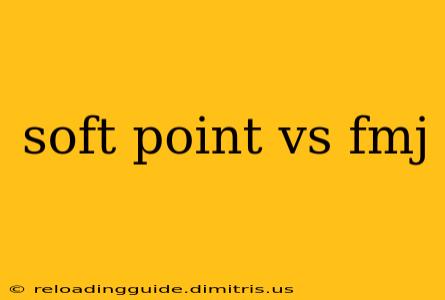Soft Point vs. FMJ: Understanding the Differences in Ammunition
Choosing the right ammunition is crucial, whether you're a hunter, competitive shooter, or simply target practicing. Two common bullet types often spark debate: Full Metal Jacket (FMJ) and Soft Point (SP). Understanding their key differences is vital for making informed decisions based on your specific needs. This guide will break down the characteristics of FMJ and SP ammunition, highlighting their advantages and disadvantages.
What is Full Metal Jacket (FMJ) Ammunition?
FMJ ammunition features a bullet completely encased in a metal jacket, typically made of copper or gilding metal. This jacket completely covers the lead core, creating a smooth, streamlined projectile.
Advantages of FMJ:
- High Velocity: The streamlined design minimizes friction, resulting in higher velocities and flatter trajectories.
- Consistent Accuracy: The uniform construction leads to greater accuracy and predictability.
- Cost-Effective: FMJ rounds are generally less expensive than other types of ammunition.
- Reduced Barrel Fouling: The metal jacket helps to reduce lead buildup in the firearm's barrel.
- Suitable for Practice: Its affordability and consistent performance make it ideal for target practice.
Disadvantages of FMJ:
- Limited Expansion: The full metal jacket prevents expansion upon impact, leading to a smaller wound channel and potentially less stopping power compared to expanding rounds. This makes it less suitable for hunting larger game where a quick, humane kill is paramount.
- Increased Risk of Ricochet: The hard metal jacket increases the risk of ricocheting off hard surfaces, posing a greater safety hazard.
What is Soft Point (SP) Ammunition?
Soft point ammunition features a lead core exposed at the tip of the bullet. This exposed lead allows for expansion upon impact.
Advantages of SP:
- Increased Expansion: The exposed lead core expands upon impact, creating a larger wound channel and significantly greater stopping power than FMJ rounds. This is ideal for hunting and self-defense situations.
- Superior Energy Transfer: The expansion enhances the energy transfer to the target, leading to a quicker and more humane kill in hunting situations.
Disadvantages of SP:
- Lower Velocity: The exposed lead can slightly increase friction, resulting in a slightly lower velocity than FMJ rounds.
- Higher Cost: Soft point ammunition tends to be more expensive than FMJ rounds.
- Potential for Jacket Separation: While less common with modern manufacturing techniques, there is a slightly higher potential for jacket separation during impact.
- Less Suitable for Practice: The higher cost and potential for damage to targets makes it less ideal for consistent target practice.
Choosing Between FMJ and Soft Point: A Summary
The choice between FMJ and SP ammunition hinges on your intended use:
-
Target Practice and Competition: FMJ ammunition is generally the preferred choice due to its cost-effectiveness, consistent accuracy, and high velocity.
-
Hunting: Soft point ammunition is often preferred for its superior expansion and stopping power, ensuring a humane and ethical harvest. Specific bullet choice will depend on game size and regulations.
-
Self-Defense: The choice is more complex and depends on legal restrictions and personal preference. Both FMJ and SP rounds have their advocates, and the best choice will be determined by individual circumstances and training. Consulting with firearms experts and law enforcement is recommended.
This comparison provides a general overview; specific performance characteristics will vary between manufacturers and bullet designs. Always consult the manufacturer's specifications and relevant legal regulations before using any ammunition. Safe handling practices are paramount. Remember, responsible firearm ownership involves thorough knowledge of ammunition types and their appropriate use.

